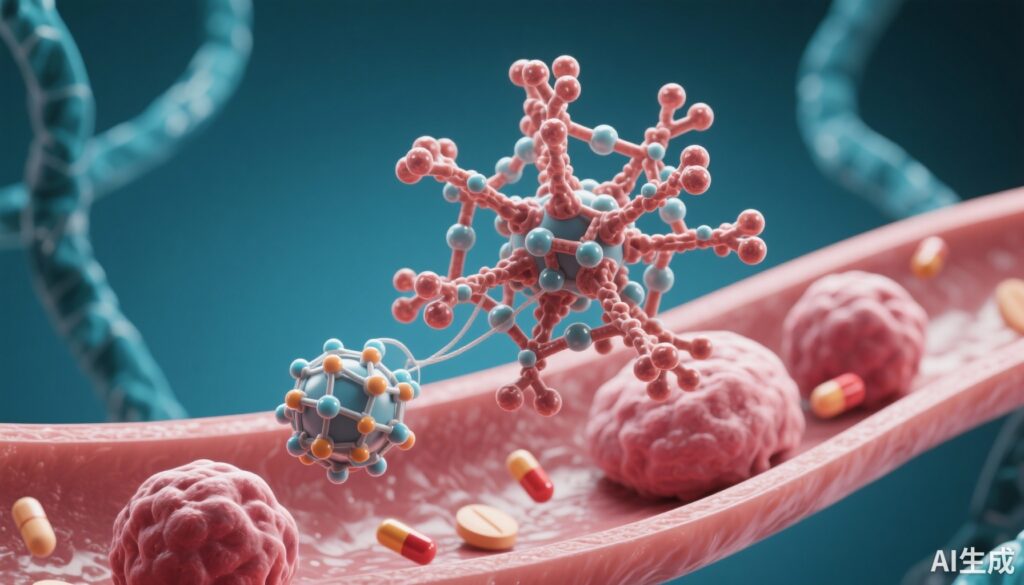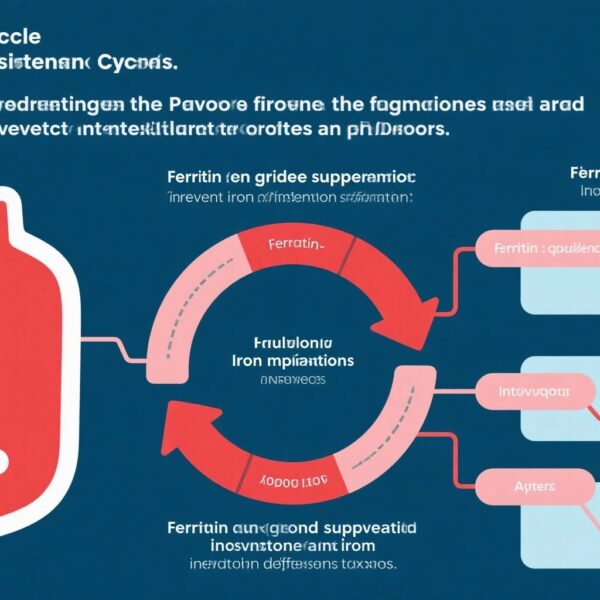Highlight
This early-phase clinical trial evaluated the safety, tolerability, pharmacokinetics, and preliminary efficacy of DEP-SN38, a polylysine-based dendrimer-nanoparticle conjugate of SN38, the active metabolite of irinotecan, in adults with advanced solid tumors. The study identified a recommended dose of 12.5 mg/m2 with low incidence of severe gastrointestinal toxicities and neutropenia as the dose-limiting toxicity. Notably, objective responses were observed, particularly in platinum-resistant ovarian cancer and colorectal cancer patients treated with every 2-week regimens, either as monotherapy or combined with fluorouracil/leucovorin (FU/LV).
Study Background and Disease Burden
Advanced solid tumors often present therapeutic challenges due to acquired resistance, prior heavy pretreatment, and limited options that balance efficacy and tolerability. Irinotecan, a topoisomerase I inhibitor used in multiple solid tumors such as colorectal and ovarian cancers, relies on conversion to its active metabolite SN38 for antitumor effects. However, SN38’s clinical use is limited by poor solubility, systemic toxicity—especially severe neutropenia and gastrointestinal side effects—and suboptimal tumor targeting.
Dendrimer-nanoparticle (DEP) delivery systems employ polylysine-based nanocarriers that can conjugate and solubilize hydrophobic drugs like SN38, aiming to enhance tumor-selective delivery, reduce systemic exposure, and improve therapeutic indices. This platform holds potential to optimize irinotecan efficacy while mitigating its dose-limiting toxicities, addressing a significant unmet need in the management of heavily pretreated advanced cancers.
Study Design
This was a multicenter, open-label, early-phase clinical trial (ClinicalTrials.gov ISRCTN99654100) enrolling 114 patients with advanced solid tumors refractory to standard therapies. The median number of prior systemic therapies per patient was 4, emphasizing a heavily pretreated population.
Patients received intravenous DEP-SN38 administered via three regimens: monotherapy every 3 weeks (Q3W), monotherapy every 2 weeks (Q2W), and combination therapy Q2W with fluorouracil/leucovorin (FU/LV). Dose escalation explored SN38 equivalent doses ranging from 8 to 15 mg/m2 to establish recommended doses.
The primary endpoints were safety and tolerability, assessing treatment-related adverse events (TRAEs) and dose-limiting toxicities (DLTs). Secondary endpoints included pharmacokinetic profiling, objective response rate (ORR) per RECIST v1.1, disease control rate (DCR), and progression-free survival (PFS).
Key Findings
Safety and Tolerability: Across all regimens, the recommended DEP-SN38 dose was 12.5 mg/m2. The majority of TRAEs related to DEP-SN38 were mild or moderate (89.7%). Neutropenia emerged as the primary dose-limiting toxicity and was the most frequent grade 3/4 TRAE, constituting 48% of severe events. Importantly, severe gastrointestinal toxicities such as grade 3 diarrhea and vomiting were rare, each seen in less than 1% of patients, and nausea was infrequent (1.8%). Notably, cholinergic symptoms commonly associated with irinotecan were absent, suggesting an improved tolerability profile.
Pharmacokinetics: The nanoparticle platform demonstrated consistent systemic exposure with dosing intervals, supporting the dosing regimens explored. The data suggest optimized pharmacokinetics that favor tumor delivery while minimizing systemic toxicity, though detailed pharmacokinetic parameters warrant further publication.
Preliminary Efficacy: Indicative of clinical activity, objective response rates varied by regimen: 1.8% for Q3W monotherapy, 21.4% for Q2W monotherapy (notably 42.9% in platinum-resistant ovarian cancer [PROC]), and 12.5% for Q2W combination with FU/LV (with 14.3% in colorectal cancer [CRC]). Disease control rates were substantial: 56.4% (Q3W), 71.4% (Q2W monotherapy), and 81.3% (combination therapy).
Median progression-free survival (all treated) was 2.1 months (Q3W), 6.0 months (Q2W monotherapy), and 4.2 months (Q2W combination therapy). Patients achieving PFS ≥6 months included seven PROC patients (with three over 12 months), 12 CRC patients (including four over 12 months on combination therapy), a pancreatic cancer patient (10.2 months), a non-small cell lung cancer patient (8.4 months), and two breast cancer patients (16.6 and 6 months).
This activity in diverse tumor types, particularly in chemo-resistant settings, underscores DEP-SN38’s potential to address refractory disease.
Expert Commentary
DEP-SN38’s innovative dendrimer-nanoparticle conjugation represents a promising evolution in topoisomerase I inhibitor delivery, showing a favorable therapeutic window in advanced solid tumors. The mitigation of severe gastrointestinal toxicities and absence of cholinergic syndrome signify a meaningful improvement over traditional irinotecan regimens.
The favorable safety profile, combined with encouraging responses in heavily pretreated and resistant populations, supports further clinical development. The higher response rate observed in platinum-resistant ovarian cancer merits particular attention, a setting urgently needing effective options.
Limitations include the early-phase, non-randomized study design and heterogeneous tumor types, which preclude definitive efficacy conclusions. Larger randomized trials are necessary to confirm these findings and elucidate optimal combinations and tumor-specific indications.
Mechanistically, dendrimer conjugation may enhance tumor uptake via enhanced permeability and retention effects, as well as improve controlled SN38 release, reducing off-target toxicity. These pharmacodynamic advantages align with observed clinical tolerability.
Conclusion
The DEP-SN38 dendrimer-nanoparticle platform demonstrates a well-tolerated safety profile with substantially reduced severe gastrointestinal adverse effects and promising antitumor activity in heavily pretreated solid tumor patients. Its efficacy signals, especially in platinum-resistant ovarian and colorectal cancers, highlight its potential as a next-generation irinotecan-based therapy.
Ongoing and future studies should focus on randomized comparisons, mechanistic pharmacokinetic/pharmacodynamic modeling, and exploration of DEP-SN38 in combination regimens to fully define its clinical utility and optimize patient selection.
References
1. Liu J, Minchom AR, Greystoke A, Evans TRJ, Sarker D, Joshua AM, et al. Dendrimer-Nanoparticle (DEP) Delivery of Topoisomerase I Inhibitor, SN38 (DEP-SN38): Safety, Tolerability, and Preliminary Efficacy Study in Patients With Advanced Solid Tumors. J Clin Oncol. 2025 Sep 10;43(26):2918-2929. doi: 10.1200/JCO-25-00236. Epub 2025 Aug 1. PMID: 40749148.
2. Hochster HS. Optimizing the use of irinotecan in the treatment of colorectal cancer. Semin Oncol. 2004;31(1 Suppl 3):15-21.
3. Sandhu SK, et al. Clinical development of nanomedicine in cancer therapy. Cancer Chemother Pharmacol. 2020;85(4):679-687.


